牛津译林版高一英语上册强调句型反意疑问句语法总结与练习
高一英语译林牛津版必修一Module 1语法专练练习
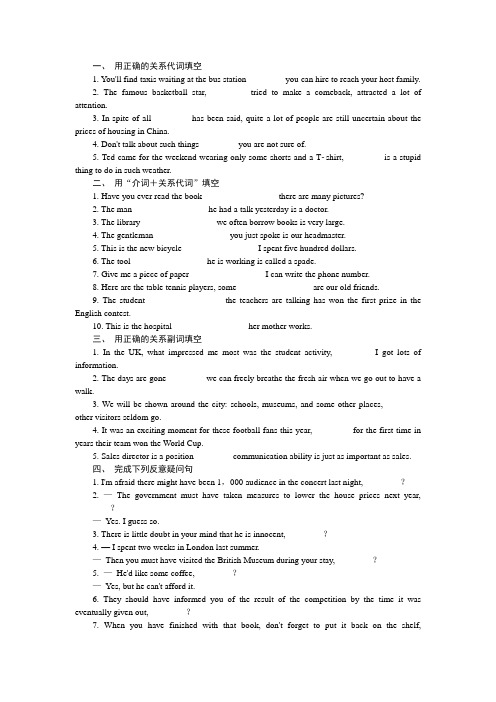
一、用正确的关系代词填空1. You'll find taxis waiting at the bus station ________ you can hire to reach your host family.2. The famous basketball star, ________ tried to make a comeback, attracted a lot of attention.3. In spite of all ________ has been said, quite a lot of people are still uncertain about the prices of housing in China.4. Don't talk about such things ________ you are not sure of.5. Ted came for the weekend wearing only some shorts and a Tshirt, ________ is a stupid thing to do in such weather.二、用“介词+关系代词”填空1. Have you ever read the book ________ ________ there are many pictures?2. The man ________ ________ he had a talk yesterday is a doctor.3. The library ________ ________ we often borrow books is very large.4. The gentleman ________ ________ you just spoke is our headmaster.5. This is the new bicycle ________ ________ I spent five hundred dollars.6. The tool ________ ________ he is working is called a spade.7. Give me a piece of paper ________ ________ I can write the phone number.8. Here are the table tennis players, some ________ ________ are our old friends.9. The student ________ ________ the teachers are talking has won the first prize in the English contest.10. This is the hospital ________ ________ her mother works.三、用正确的关系副词填空1. In the UK, what impressed me most was the student activity, ________ I got lots of information.2. The days are gone ________ we can freely breathe the fresh air when we go out to have a walk.3. We will be shown around the city: schools, museums, and some other places, ________ other visitors seldom go.4. It was an exciting moment for these football fans this year, ________ for the first time in years their team won the World Cup.5. Sales director is a position ________ communication ability is just as important as sales.四、完成下列反意疑问句1. I'm afraid there might have been 1,000 audience in the concert last night, ________?2. —The government must have taken measures to lower the house prices next year, ________?—Yes. I guess so.3. There is little doubt in your mind that he is innocent, ________?4. — I spent two weeks in London last summer.—Then you must have visited the British Museum during your stay, ________?5. —He'd like some coffee, ________?—Yes, but he can't afford it.6. They should have informed you of the result of the competition by the time it was eventually given out, ________?7. When you have finished with that book, don't forget to put it back on the shelf,________?8. I told them not everybody could run as fast as you did, ________?9. I'm sure he is unsuccessful, ________?五、单项填空1. After the storm in Beijing, people were suffering in that area, ________ urgently needed clean water, medicine and shelter to survive.A. whichB. whoC. whereD. what2. The air quality in the city, ________ is shown in the report, has improved over the past two months.A. thatB. itC. asD. what3. I wish to thank Professor Smith, without ________ help I would never have got this far.A. whoB. whoseC. whomD. which4. Julie was good at German, French and Russian, all of ________ she spoke fluently.A. whoB. whomC. whichD. that5. The science of computer, ________ rapid progress has been made in recent years, plays a very important role in our daily life.A. from whichB. in whichC. with whichD. to which6. It was April 29, 2011 ________ Prince William and Kate Middleton walked into the palace hall of the wedding ceremony.A. thatB. whenC. sinceD. before7. Opposite is St. Paul's Church, ________ you can hear some lovely music.A. whichB. thatC. whenD. where8. Creating an atmosphere ________ employees feel part of a team is a big challenge.A. asB. whoseC. in whichD. at which9. China Today attracts a worldwide readership, ________ shows that more and more people all over the world want to learn about China.A. whoB. whomC. thatD. which10. Every 40 minutes we will take a 20-minute break, ________ your guide will give a short talk on different aspects of the Great Wall.A. during thatB. and whenC. whichD. during which time11. Commercially packaged caramel apples from the USA were reported to have killed at least 7 people and sickened 32 before July 24, 2015, officials said. Typically, problems arise _______ caution is absent.A. thatB. whatC. whereD. in which12. When it comes to the most instructive afterschool activities, ________ has greater potential than love charity held every year in Huaiyin High School, ________ in my eyes will lead to students' better development.A. nothing; whichB. none; whereC. nothing; whereD. none; which13. Never should we forget the war and sufferings ________ caused to the people.A. itB. whichC. thatD. what一、1. which 2. who 3. that 4. as 5. which二、1. in which 2. with whom 3. from which4. to/with whom5. on which6. with which7. on which8. of whom9. to whom10. in which三、1. where 2. when 3. where 4. when 5. where四、1. weren't there 2. hasn't it 3. is there 4. didn't you5. wouldn't he6. hadn't they7. will you8. didn't I9. isn't he五、1~5BCBCB6~10BDCDD11~13CDA1. B解析:句意:暴风雨之后的北京,那个地区的人们正遭受苦难,这些人急需干净的水、药品和帐篷存活下去。
牛津译林版高中英语必修一unit3lookinggood,feelinggood》(反意疑问句)
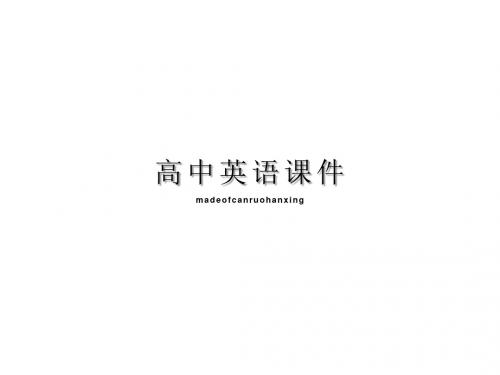
4.let’s开头的祈使句,用shallwe? letus开头的祈使句及其他用willyou?
1Don’tbelate,____w_il_ly_o_u__? 2Havearest,_____w_il_ly_o_u__? 3Letusgo,______w_i_ll_yo_u_? 4Let’sgo,___s_h_a_llw_?e
句保持一致,用否定形式。
Ibelievehewillcomebacktoschool,________? 3.主wo句n是’thI/eWedon’tthink/believe/suppose等,
疑问句部分与从句保持一致,用肯定形式
Idon’tthinkhecandoit,________? canhe
they/he. 主语是everything/something/anything/nothing等 指物的不定代词
it
Everyoneishere,___a_r_e_n_’t_t_h_e_y_/i_s_n_’t_h_e___? Somethingiswrong,_____is_n_’_ti_t __? 3.I’m开头,疑问句部分用aranxing
Module1Unit3Grammar
QuestionTags 反意疑问句
Grammar:QuestionTags
1.Sheisn’tastudent,isshe? 2.WespeakChinese,don’twe? 3.Hisfathercan’tswim,canhe? 定义:附加在陈述句后的简单问句,称 为反意疑问句。常用于口语中,征求对 方的同意或肯定。
C.isn’tsheD.isshe 2.YouandIcouldhardlyworktogether,
____D____? A.couldyouB.couldn’tI
高中英语牛津上海版高中一年级第一学期强调句专项讲解及训练(有答案)

强调句专项训练A. thatB. howC. whichD. whenA. himB. hisC. heD. himselfA. thenB. whenC. sinceD. that.A. whereB. andC. thatD. which5.It was not until he entered the classroom he realized that he had forgotten to do the homework.A. beforeB. whenC. whereD. thatA. theyB. thoseC. thatD. whoA. thatB. hasC. whatD. whoA. whenB. soC. asD. that9. _______ the Christmas shopping season begins.A. That is after ThanksgivingB. After Thanksgiving it isC. It is after Thanksgiving thatD. It is Thanksgiving thatKeys:1-5 A C D C D6-9 C A D CA. untilB. thatC. thenD. soA. thatB. whatC. whichD. whenA. thisB. thatC. heD. itA. whenB. thatC. andD. while5.It_______ Jenny and I who came to the wedding party the other day.A. beB. wasC. wereD. areA. sinceB. thatC. whenD.whichA. thatB. untilC. thenD. so8.It was on the hill_______ the young soldier died for the country they set up amonument.A. where ... for whichB. where ... thatC. so ... thatD. where ... so9.It is in this lake________ my classmates and I often spend a holiday boating.A. whichB. whereC. thatD. inwhichA. only ... that they are notB. not only ... that they areC. only ... which they aren'tD. not only ... when they areKeys: 1-5 B A D B B6-10 B A B C BA. Where it was thatB. Who it was thatC. Where was it thatD. Where was that2.—Wasn't it Dr Wang who spoke to you just now?—.A. I didn't know he wasB. Yes, it wasC. No, he wasn'tD. Yes, he didA. where... thatB. where... whereC. that... whereD.that ... thatA. that ... thatB. where ... thatC. which ... whereD.that ... whereA. that . . . thatB. that . . . whereC. where . . . thatD.where ... in whichA. whenB. andC. thatD. whichA. which ... itB. that ... itC. which . . . thatD.that . . . thatA. did the president agreeB. that did the president agreeC. that the president agreedD. agreed the presidentA. thatB. untilC. beforeD. whenA. whichB. whereC. thatD. / Keys: 1-5 CDABC6-10 CBCACA. which . . . thatB. where . . . whereC. that . . . whereD. which . . . whereA. It is only then . . . thatB. It was that . . . whenC. It is only when . .. thatD. It was when . . . thenA. that; that; whoB. it; that; thatC. it; who; thatD. this; who; whoA. because . . . what . . . thatB. because of . . . how ... whichC. as . . . why . . . thatD. because ... that . . . which5.Why________ this kind of glasses made in that shop wears comfortably?A. is it thatB. is itC. are theyD. was itthatA. Was it; thatB. Was it; whenC. Is it; thatD. Is it; whenA. It; which; thatB. It; which; whichC. It; that; thatD. It; that; whichKeys: 1-5 ACCAA6-7 ACA. That... thatB. It. .. thatC. That. . . whenD. It.. . whenA. what... thatB. that... thatC. what... whatD. that... whatA. with whichB. thatC. whichD. whatA. that; gotB. since; gotC. that; had gotD. for; to gotA. where ... thatB. that ... whereC. where ... whichD. which ... whereA. whichB. thatC. of whichD. whatA. because he had failed in the examB. his failure in the examC. because of his failure in the examD. as he failed in the examA. then you realizeB. do you realizeC. that you realizeD. you then realizeA. that is was whenB. when it was thatC. when was it thatD. that was it whenA. who is itB. who it isC. it is whoD. it iswhomKeys:1-5 B A B B A6-10 B B C B B综合训练A. thatB. whichC. whatD. /A. oneB. thatC. whatD. itA. What is it thatB. What it is thatC. How is it thatD. How it is that4. _______ that silver is not widely used as a conductor?A. Why isB. Is it whyC. Why is itD. Whyis thatA. when, thatB. until, thatC. until, whenD. when,thenA. thatB. in whichC. in whereD. whichA. thatB. whileC. in whichD. thenA. whileB. whichC. thatD. sinceA. untilB. thatC. thenD. soA. himB. hisC. himselfD. he11.—Who is Mary?A. heB. herC. sheD. theyA. ThereB. ThisC. ThatD. ItA. areB. wereC. had beenD. wasA. it, whenB. that, thatC. it, thatD. that,when15.It_______ at Christmas that John Smith gave Mary a handbag.A. must haveB. will beC. might have beenD. may have hadA. that, thatB. where, whereC. that, whereD. where,thatA. whenB. thatC. sinceD. untilA. as, asB. that, thatC. that, whichD. which,whichA. many years sinceB. many years ago thatC. since many years ago whenD. for many years since20. _______ he made up his mind to take a trip to Europe?A. When was it thatB. That was it whenC. Whom was it thatD. Where was it thatA. Where it was thatB. Who it was thatC. Whom was it thatD. When was it thatA. what it is about Mary thatB. that is it about Mary whatC. what is it about Mary thatD. that it is about Mary whatA. that, whatB. as, thatC. because, thatD. when,that24.—Were all three people in the car injured in theaccident?—No, ________ only the two passengers whogot hurt.A. it wasB. there isC. it wereD. therewas25.— Was it the new school master who walked by?—.A. It must be thatB. It must have been himC. He must beD. This must have beenA. that, whichB. which, thatC. where, thatD. that,where27.It was for this reason her uncle moved out of New York and settled down in a smallvillage.A. whichB. whyC. thatD. how28.It was_______ he said_________ disappointed me.A. that/whatB. what/thatC. what/whatD.that/thatA. necessary; whenB. that important of; whyC. even if; forD. it because of; thatA. that it wasB. if it isC. was itD. if itwasKeys: 1-5ABACB6-10 AACBD 11-15 BDDCC16-20 DABBA 21-25 DACAB26-31 CCBBDD。
反义疑问句的用法归纳及习题

反义疑问句的用法归纳及习题反义疑问句是英语语法中的常用句型之一,它由一个肯定或否定的陈述句和一个所加的疑问句构成。
通过反义疑问句的使用,我们可以在表达思想观点时增强语气,提出问题的同时向对方确认自己的观点。
本文将介绍反义疑问句的用法,并提供相应的习题供读者进行练习。
一、反义疑问句的构成反义疑问句由两个部分组成:一个陈述句和一个疑问句。
陈述句通常是一个完整的句子,而疑问句则是一个简化的疑问句。
1. 如果陈述句是肯定句,则疑问句部分用否定形式;例如:- They are from China, aren't they?- You can swim, can't you?2. 如果陈述句是否定句,则疑问句部分用肯定形式;例如:- He doesn't like coffee, does he?- They haven't arrived yet, have they?二、反义疑问句的用法1. 确认对方的观点或陈述:当说话人对对方的陈述持怀疑态度时,可以使用反义疑问句来进行确认。
例如:- You haven't seen the movie, have you?- You don't like ice cream, do you?2. 请求对方的帮助或征求对方的意见:当说话人需要对方给予回应或意见时,可以使用反义疑问句来婉转地提出请求。
例如:- It's a beautiful day, isn't it? (期待对方赞同这个说法)- This problem is difficult, isn't it? (希望对方给予帮助或建议)3. 表达自己的观点或感受:反义疑问句也可以用来表达自己的观点或感受,并期待对方与自己保持一致或不一致。
例如:- She is a talented singer, isn't she?- You're not feeling well, are you?三、习题练习以下是一些习题,供读者练习反义疑问句的用法。
牛津高中英语模块一语法---反意疑问句

高一英语语法——反意疑问句一、基本用法与结构反意疑问句由“陈述句+简单疑问句”两部分组成,第一部分提出一种看法,第二部分用来质疑或表示证实。
陈述部分与疑问部分的动词时态和动词性质应保持一致,而且肯定和否定形式彼此相反,即陈述部分为肯定式时,疑问部分用否定式,陈述部分为否定式时,疑问部分用肯定式:He likes English, doesn’t he? 他喜欢英语,不是吗?He doesn’t like Engl ish, does he? 他不喜欢英语,是吗?二、反意疑问句的用法:注意:1.当陈述部分带有否定前缀或后缀的否定词,如dislike, unfair, careless时,作肯定句处理,疑问部分用否定形式。
eg: She dislikes the novel, doesn't she?It's unfair, isn't it?2、当陈述部分的have/has不表示“有”,而表示“进行”、“举行”等,如:have breakfast / lunch, have a meeting,have a talk,疑问部分要用do/does/did,不用have/has/hadeg: They had a good time last night, didn't they?3、当陈述部分中的have/has/had to do sth.表示“不得不做...”时,疑问部分用don’t/doesn’t /didn’t。
eg: She has to stay at home to look after her sick mother, doesn't she?4、当陈述部分含有状语从句时,疑问部分的主语应和主句的主语一致。
eg: When you arrived at the station, the train had left, hadn't it?The train had left, when you arrived at the station, hadn't it?5、当陈述部分是并列(常用并列连词:so, and, but, or, for)反意部分和第二个分句一致eg: Mary is a good student, but she often comes to school late, doesn't she?6、当陈述部分的主语是one时,反意部分的主语也用one或he。
牛津译林版高一英语上册必修一 语法总结
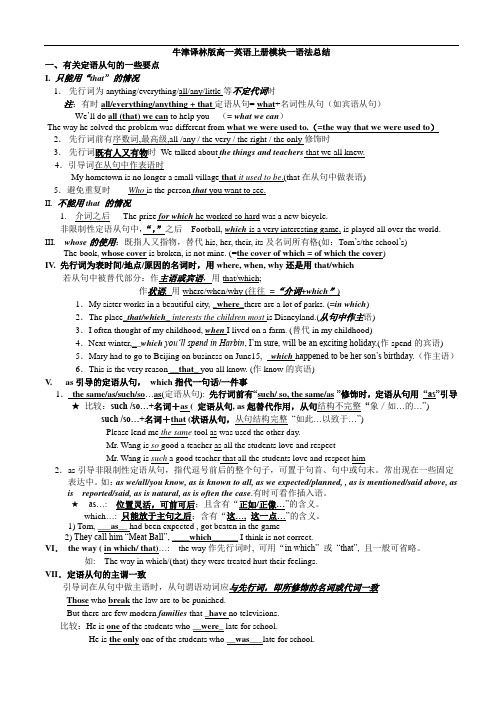
牛津译林版高一英语上册模块一语法总结一、有关定语从句的一些要点I. 只能用“that”的情况1.先行词为anything/everything/all/any/little等不定代词时注:有时all/everything/anything + that定语从句= what+名词性从句(如宾语从句)We’ll do all (that) we can to help you (= what we can)The way he solved the problem was different from what we were used to.(=the way that we were used to)2.先行词前有序数词,最高级,all /any / the very / the right / the only修饰时3.先行词既有人又有物时We talked about the things and teachers that we all knew.4.引导词在从句中作表语时My hometown is no longer a small village that it used to be.(that在从句中做表语)5.避免重复时Who is the person that you want to see.II. 不能用that 的情况1.介词之后The prize for which he worked so hard was a new bicycle.非限制性定语从句中,“,”之后Football,which is a very interesting game, is played all over the world. III. whose的使用:既指人又指物,替代his, her, their, its及名词所有格(如:Tom’s/the school’s) The book, whose cover is broken, is not mine. (=the cover of which = of which the cover)IV. 先行词为表时间/地点/原因的名词时,用where, when, why还是用that/which若从句中被替代部分:作主语或宾语,用that/which;作状语, 用where/when/why (往往=“介词+which”)1.My sister works in a beautiful city, _where_there are a lot of parks. (=in which)2.The place_that/which_ interests the children most is Disneyland.(从句中作主语)3.I often thought of my childhood, when I lived on a farm. (替代in my childhood)4.Next winter,__which you’ll spend in Harbin, I’m sure, will be an exciting holiday.(作spend的宾语)5.Mary had to go to Beijing on business on June15, which h appened to be her son’s birthday.(作主语)6.This is the very reason __that_ you all know. (作know的宾语)V. as引导的定语从句,which指代一句话/一件事1.the same/as/such/so…as(定语从句):先行词前有“such/ so, the same/as ”修饰时,定语从句用“as”引导★比较:such /so…+名词+as ( 定语从句, as起替代作用,从句结构不完整“象/如…的…”) such /so…+名词+that (状语从句,从句结构完整“如此…以致于…”)Please lend me the same tool as was used the other day.Mr. Wang is so good a teacher as all the students love and respectMr. Wang is such a good teacher that all the students love and respect him 2.as引导非限制性定语从句,指代逗号前后的整个句子,可置于句首、句中或句末。
牛津译林版2023必修 第一册Unit 1 Back to school 语法Grammar练习含解
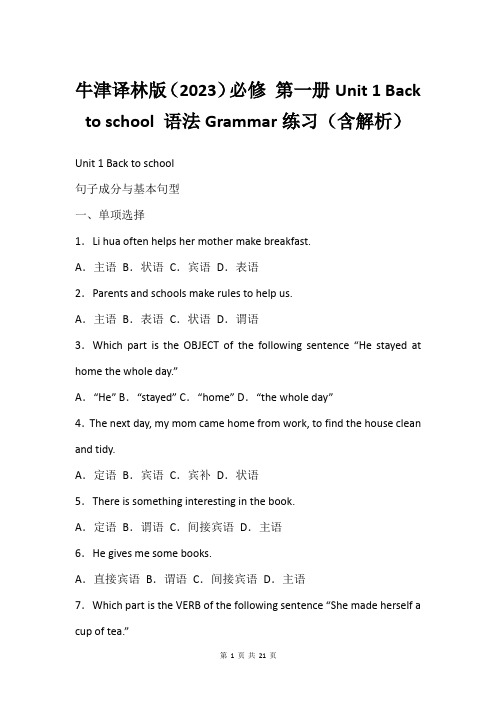
牛津译林版(2023)必修第一册Unit 1 Back to school 语法Grammar练习(含解析)Unit 1 Back to school句子成分与基本句型一、单项选择1.Li hua often helps her mother make breakfast.A.主语B.状语C.宾语D.表语2.Parents and schools make rules to help us.A.主语B.表语C.状语D.谓语3.Which part is the OBJECT of the following sentence “He stayed at home the whole day.”A.“He” B.“stayed” C.“home” D.“the whole day”4.The next day, my mom came home from work, to find the house clean and tidy.A.定语B.宾语C.宾补D.状语5.There is something interesting in the book.A.定语B.谓语C.间接宾语D.主语6.He gives me some books.A.直接宾语B.谓语C.间接宾语D.主语7.Which part is the VERB of the following sentence “She made herself a cup of tea.”A.“herself” B.“cup” C.“made” D.“of”8.Which part is the VERB of the following sentence “I play sports with my friend.”A.“play” B.“sports” C.“with” D.“friend”9.Which part is the VERB of the following sentence “I saw a huge model plane.”A.“a” B.“huge” C.“plane” D.“saw”10.Did Tom and Tim go to see the movieA.表语B.主语C.宾语D.定语11.He saw two boys playing basketball on the playground just now. A.主语B.表语C.宾语D.宾补12.She is happy with her new job.A.表语B.谓语C.宾语D.状语13.Thank you very much for providing us with food and living places. A.定语B.表语C.宾语D.谓语14.China is a country which has the largest population in the world. A.宾语B.定语C.主语D.表语15.You can’t imagine what a terrible weekend I had.A.宾语B.表语C.定语D.谓语16.They are having an active discussion on how to use time properly. A.表语B.状语C.宾语D.主语17.He ran out of his money so he went to find a new job.A.宾语B.谓语C.主语D.表语18.With his left hand, he bandaged himself so that he would not lose too much blood.A.宾语B.表语C.状语D.定语19.It is impossible to finish the work on time.A.谓语B.宾语C.主语D.状语20.It has four big legs.A.表语B.宾语C.宾补D.定语21.The family are making zongzi.A.谓语B.主语C.状语D.表语22.His friend Bob is smart.A.宾语B.表语C.定语D.状语23.While the boy was cooking, it started raining suddenly.A.谓语B.宾语C.表语D.状语24.Mrs. Black fell asleep quickly after a long walk last Saturday.A.谓语B.表语C.定语D.状语25.— Do you know the sentence structure of “They painted the walls blue”— Yes, it is ________.A.S+V+DO+OC B.S+V+P C.S+V+IO+DO D.S+V+O26.The sentence structure of “We call Gaoyou the Stamp Town.” is ________.A.S+V+P B.S+V+IO+DO C.S+V+DO+OC D.S+V+O27.What is the sentence pattern(句型) of the sentence “The news made all of us excited.”A.S+V+P B.S+V+O+CC.S+V+IO+DO D.S+V+DO+A28.The doctor told me not to play computer games anymore. 句子结构是______。
牛津高中英语M1U3 Grammar 反义疑问句
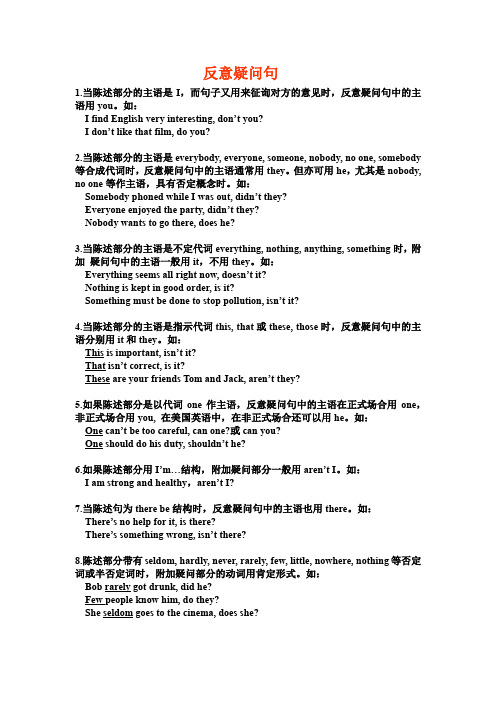
反意疑问句1.当陈述部分的主语是I,而句子又用来征询对方的意见时,反意疑问句中的主语用you。
如:I find English very interesting, don’t you?I don’t like that film, do you?2.当陈述部分的主语是everybody, everyone, someone, nobody, no one, somebody 等合成代词时,反意疑问句中的主语通常用they。
但亦可用he,尤其是nobody, no one等作主语,具有否定概念时。
如:Somebody phoned while I was out, didn’t they?Everyone enjoyed the party, didn’t they?Nobody wants to go there, does he?3.当陈述部分的主语是不定代词everything, nothing, anything, something时,附加疑问句中的主语一般用it,不用they。
如:Everything seems all right n ow, doesn’t it?Nothing is kept in good order, is it?Something must be done to stop pollution, isn’t it?4.当陈述部分的主语是指示代词this, that或these, those时,反意疑问句中的主语分别用it和they。
如:This is important, isn’t it?That isn’t correct, is it?These are your fri ends Tom and Jack, aren’t they?5.如果陈述部分是以代词one作主语,反意疑问句中的主语在正式场合用one,非正式场合用you, 在美国英语中,在非正式场合还可以用he。
- 1、下载文档前请自行甄别文档内容的完整性,平台不提供额外的编辑、内容补充、找答案等附加服务。
- 2、"仅部分预览"的文档,不可在线预览部分如存在完整性等问题,可反馈申请退款(可完整预览的文档不适用该条件!)。
- 3、如文档侵犯您的权益,请联系客服反馈,我们会尽快为您处理(人工客服工作时间:9:00-18:30)。
牛津译林版高一英语上册强调句型语法总结一、有关强调句型的几个要点I. 强调句型的基本结构:It is/was+被强调部分(词/词组/句子) + that/who +原句所剩部分★:除强调人时,可用“who”外,其它情况都只能用“that”,原句所剩部分不变,特别是谓语动词不变It was because he drove carelessly that he had the accident.It is Tom and Peter who are responsible for the failure of the experiment.★not…until句型的强调结构:It was not until…that….It was not until the dish died in the lake that people realized how serious pollution was.II. 强调句型的一般与特殊疑问句形式:一般疑问句:Is/Was it +被强调部分+ that…? Was it in the office that you found my book?特殊疑问句:When/Where/What + is/was it + that…?--What was it that made Tom what he is today?III. 注意比较强调句型与某些状语从句。
比较:It was midnight when they arrived home.(状语从句)It was at midnight that they arrived home.(强调句型)注:强调句型的一个特征是要“能够还原”原句为:They arrived home at midnight二、有关反意疑问句的几个要点1.陈述部分有few/none/nowhere/ never/hardly/seldom等否定词,问句用肯定She seldom tells a lie, does she?2.否定词缀un- / im- /in- /dis- 构成的词仍视为肯定Your father is unhappy, isn’t he?3.主从复合句的反意问句(1)一般: 与主句一致They all think that English is very important,don’t they?(2)特殊:当陈述部分为“I/We (don’t) think/believe/ consider/ + that从句”时,与从句保持一致I think that he has done his best, hasn’t he? We don’t believe that the news is true, i s i t?4.祁使句的反意问句,一般用“will you”, 表委婉请求或邀请时,可用“won’t you”You feed the bird today, will you? Don’t make any noise, will you?比较:Let us stop to rest, will you? Let’s go home together, shall we?5.情态动词表猜测的句子的反意问句,与其不表猜测时一样He might have left his pen in the classroom yesterday, didn’t he? (不表猜测时为He left his pen…,didn’t he?) He must have waited for a long time, _hasn’t he_ ? (不表猜测时为He has waited for a long time, hasn’t he?)6.He used to liv e in the country, didn’t / used n’t he?To do one good deed is easy for a person, isn't it?Where to hold the meeting has not been decided, has it?There are two cakes on the plate, aren’t there?You’d better finish your homework now, hadn’t you?7. 反意问句或反诘句的答语都应遵循前后一致的原则, 其意义应看后半部分。
--It didn’t rain last night, did it? --Yes, it did, for the ground is wet.--She never sleeps at class. --_Yes. Sometimes she does.1. The news that they failed their driving test discouraged him, _______?A. did theyB. didn’t theyC. did itD. didn’t it2. What a lovely day, ______?A. doesn’t it B. isn’t it C. shan’t it D. hasn’t it3. “Mary doesn’t go in for sports, does she?”“__________.”A. No, but Joe does.B. Yes, but Joe doesn’t.C. Yes. And Joe doesn’t eitherD. No, and Joe does too4. –––I don’t suppose he could have done well in the exam last week, _______ he?––– _______, he almost failed to pass the exam.A. had; YesB. has; NoC. couldn’t; YesD. did; No5. She hardly ever speaks to you in English, ________? A. does she B. doesn’t she C. can she D. can’t she6. He seldom has lunch at school, ______ ? A. hasn’t he B. has he C. doesn’t he D. does he7. Bill’s aim is to inform the viewers that cigarette advertising on TV is illeg al, _______?A. isn’t itB. is itC. isn’t heD. is he8. She dislikes dancing, ______?A. doesn’t she B. does she C. don’t she D. isn’t she9. Sarah had her washing machine repaired the day before yesterday, she?A. hadB. didC. hadn’tD. didn’t10. If you want help ––– money or anything, let me know, ________ you?A. don’tB. willC. shallD. doIt’s a fine day. Let’s go fishing, ______? A. won’t we B. will we C. don’t we D. shall we12. We forgot to bring our tickets, but please let us enter, _______.A. do you B. can we C. will you D. shall we13. When you’ve finished with that book, don’t forget to put it back one the shelf, _____?A. do youB. don’t youC. will youD. won’t you––– Where is John, do you know?––– He must be in the reading-room, _______?A. mus tn’t heB. isn’t heC. doesn’t heD. isn’t JohnI don’t think he could have done such a stupid thing last night, ________?A. do IB. could heC. did heD. has he16. There is no light in the dormitory. They must have gone to the lecture. ________?A. didn’t theyB. don’t theyC. mustn’t theyD. haven’t the y17. There was a loud scream from the backstage immediately after the concert ended, ______ ?A. wasn’t thereB. was thereC. didn’t itD. did it18. He never said that he was good at mathematics, ________ ?A. was heB. wasn’t heC. did heD. didn’t he19. I’m sure you’d rather she went to school by bus, _______?A. hadn’t youB.wouldn’t youC.aren’t ID. didn’t she20. Brian told you that there wasn’t anyone in the room at that time, ______ ?A. was thereB. wasn’t thereC. didn’t heD. did he20.I don’t think she had a good time there this summer, ______?A. do IB. had sheC. did sheD. didn’t she21.I don’t believe that she has do ne so much work in a week,____?A. do I B. don’t I C. has she D. hasn’t she22.I’d like to take tomorrow off, _______ I ?A. shall B. may C. would D. should23.I wish to go with you next week, ______?A. will I B. do I C. must I D. may I。
